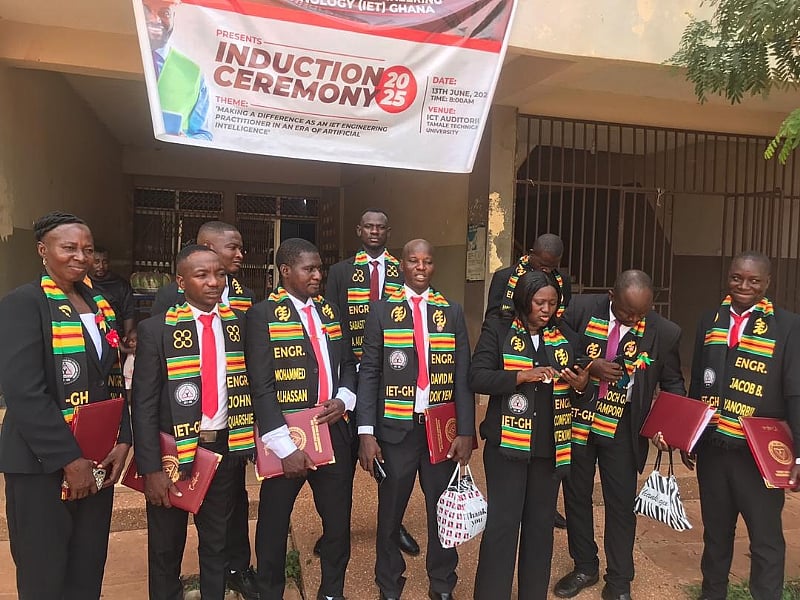The Northern Branch of the Institution of Engineering and Technology, Ghana (IET-GH), has held its second induction ceremony for newly qualified engineering professionals, with a strong call for continuous learning and the adoption of emerging technologies.
Speaking at the ceremony held at the ICT Auditorium of Tamale Technical University (TaTU), the National President of IET-GH, Engr. Henry Kwadwo Boateng, urged engineers to lead the charge in building smarter, more efficient, and environmentally sustainable systems.
“Your journey of growth should never stop because the world needs engineers who are ready not only to respond but to lead and therefore need to endeavour to lead the charge in exhibiting professionalism in building more efficient, intelligent, and environmentally responsible systems,” he said.
He emphasized that the world is facing pressing global challenges, from climate change and environmental degradation to the growing demand for resilient infrastructure.
“We live in a time of significant global challenges from climate change and environmental degradation to the increasing demand for smart, resilient infrastructure,” he added.
Themed “Making a Difference as an IET-GH Engineering Practitioner in the Era of AI and the Internet of Things,” the event brought together senior figures from academia and industry, including Eng. Seth Ayim, Executive Director; Eng. Gibson Siayire, Northern Sector Treasurer; and other stakeholders.
Engr. Boateng stressed the central role of sustainable engineering in modern practice, pointing out that engineers are now expected to be innovators and problem solvers.
“Sustainable and resilient engineering is now at the heart of our profession. We are no longer just builders and designers—we are problem solvers shaping a world that must endure and adapt,” he said.
He also highlighted the transformative potential of Artificial Intelligence (AI) and the Internet of Things (IoT), urging engineers to leverage these technologies to deliver impactful solutions.
“The integration of Artificial Intelligence (AI) and the Internet of Things (IoT) provides powerful tools to help us build more efficient, intelligent, and environmentally responsible systems,” he noted.
While celebrating the inductees’ achievement, Engr. Boateng challenged them to keep pace with technological change through lifelong learning.
“This milestone marks not only your professional growth but also your entry into a future defined by innovation, sustainability, and impact,” he said. “The reality is that while our academic systems are evolving, they have not fully caught up with the rapid advancements in technology. This places a responsibility on each of us to pursue continuous learning.”
He reaffirmed IET-GH’s commitment to supporting its members through training, mentorship, technical resources, and professional networks.
“Let your work be guided by innovation, excellence, and a deep responsibility to society and the environment. Together, let us build a future that is sustainable, resilient, and proudly engineered by Ghanaian professionals,” he concluded.
Also addressing the ceremony, the Northern Sector Chair of IET-GH, Engr. John Amoah, noted that the chapter has been proactive in engaging members through in-service training to improve professional capacity and support their businesses.
He revealed that the chapter is working closely with sister institutions to uphold high standards and professional ethics in engineering practice. He warned that the collapse of infrastructure is often due to the use of substandard materials and the work of unlicensed individuals posing as professionals.
Engr. Amoah therefore advised the public to always verify the credentials of engineers before hiring their services.
“Check the license and certificate of any engineer you engage,” he urged, “because engaging unqualified individuals endangers lives and undermines the integrity of the profession.”


